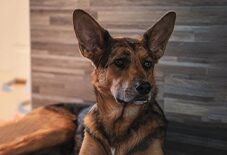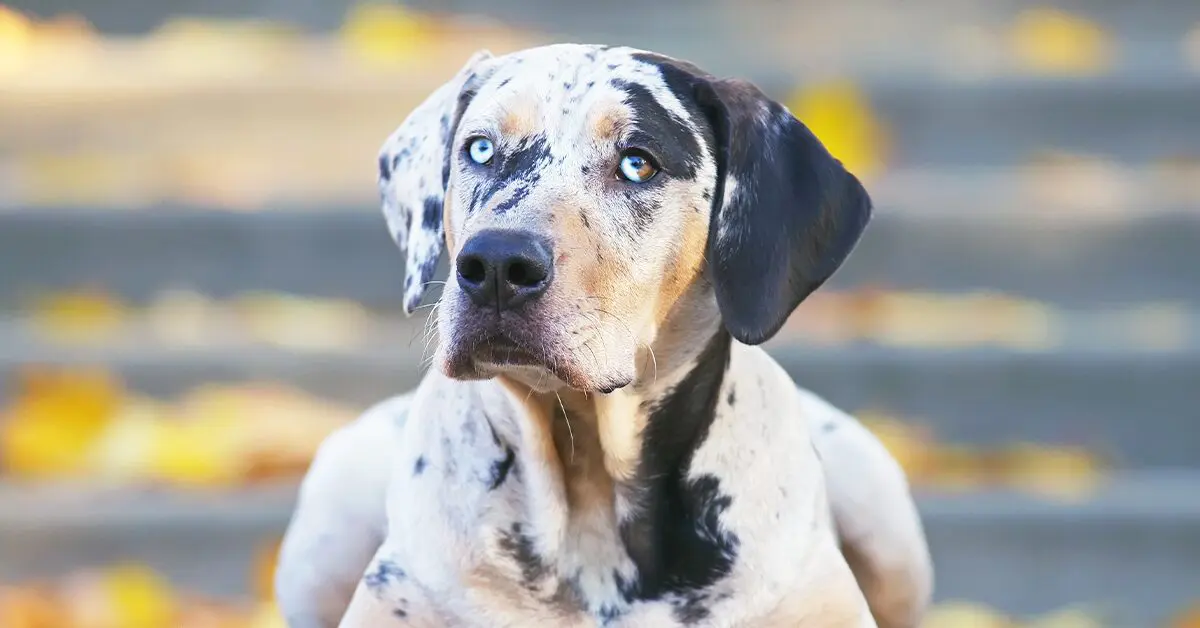
Meet the Catahoula Leopard Dog
Protective Pooch
Top Working Dog
Best Fur Friend
Born and bred in Louisiana, I’m a Southern sweetheart with hard-working habits. I’m known for my striking beauty and leopard-like coat, but my eyes are really the star of the show, coming in bright blue, green, brown, or amber. When it comes to my grooming needs, you don’t have to do much, but training and exercise are another story!
I can be pretty ruff and tough. I have high energy levels, so small apartments aren’t for me and I’d love a fenced yard! I’m going to need at least an hour of high-intensity exercise every day. I like to please, so I’m pretty easy to train as long as you’re consistent. I have a strong prey drive, so early socialization is key. Along with exercise, I need mental stimulation, so give me plenty of things to do! I love my family, but you should know I’m just okay with other dogs and little kids. Be cautious when adding more members to the fam. I’m a really cool dog with lots to offer. Take me home and you’ll see what I mean!
Ready to learn more about me? Let’s dig in.
Ready to learn more about me? Let’s dig in.
 My Many Looks
My Many Looks

Black

Blue
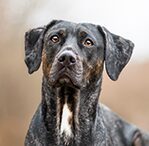
Brindle

Red
 My Breed Characteristics
My Breed Characteristics
 Furbulous Fact
Furbulous Fact
Furprise! Us Catahoula Leopard Dogs are almost like ducks; we have webbed feet that extend way farther down our toes than other dogs. These webs came in handy growing up in Louisiana where we regularly had to plod through the swampy southern marshland. Our paws also make us pawesome swimmers that can float furever. We were pretty much built to live here, which is why we’re the state dog of Louisiana. Swamps, lakes, marshes, swimming pools – we can handle any body of water!
 As I Grow Up
As I Grow Up
As you can see, we Catahoula Leopard Dogs age pretty gracefully. Here are a few key milestones in my growth and development to be aware of as I grow up from a pupper to an adult and senior!
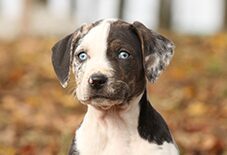
Puppy3-12 Weeks
Train and socialize me early. Without proper guidance and enrollment in puppy kindergarten, I can grow up territorial and protective.
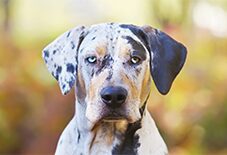
Adult2-5 Years
I’m a pawsome hiking companion because I have lots of stamina and can navigate any terrain. Take me on lots of hikes to tire me out.
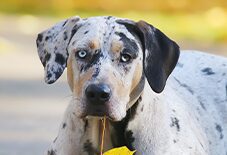
Senior8-12 Years
As I get older, I can suffer from deafness and loss of sight. But don’t worry! No matter what, I’ll remain a lovable and loyal friend.
 History of My Breed
History of My Breed
My ancestry consists of many, many dogs, so sit tight and allow me to walk you through my family tree. In 1539, Spanish explorer Hernando de Soto came to Florida where he noticed there was only one species of domesticated animal, the Native American’s dogs. These pups were crossbred with Bloodhounds, Mastiffs, and Greyhounds that were brought by other Spanish explorers, and then when the French arrived, they crossbred us again. Our unique ancestry is reflected in our unique appearance, with eye colors and markings on our coats that show our detailed history!
We grew up in Louisiana, in the Catahoula Lake area to be exact, which is what we’re named after. Catahoula in Choctaw translates to “sacred lake” – a special name for a special place, and a special doggo! We were sometimes called Catahoula Curs, Catahoula Leopard Curs, or Catahoula Hounds. When we became the official state dog of Louisiana in 1979, Catahoula Leopard Dogs became our official name.
We were bred by the settlers of Louisiana to pen and catch wild hogs and cows, and eventually we were in charge of managing entire herds! Unlike other herding dogs, we used a unique method to get the job done. We created a “canine fence” around the herds, and our masters would direct the herd inside the fence. Teamwork makes the dream work! p> The Louisiana Catahoula Cur Association was formed in 1976, and the
The National Association of Louisiana Catahoulas came one year later.
The American Catahoula Association was founded in 1977 to promote and maintain the breed, holding events like Treeing, Hog Bay, Cow Bay, and Cow Trials.
The United Kennel Club was the first registry to recognize our breed in 1995, and we entered the American Kennel Club’s Foundation Stock Service group in 1996. We’re still considered a rare breed, so we’re not fully recognized by the AKC yet.
 Pawesome Pups to Parent
Pawesome Pups to Parent
In addition to purebred Catahoula Leopard Dogs like me, there are tons of pawfectly sweet mixed-breed Catahoulas that are looking to find their furever homes. You can learn where to find your next pet below!
 Care Tips
from Dr. Sarah Wooten, DVM
Care Tips
from Dr. Sarah Wooten, DVM 
Test your pup’s hearing.
Dogs like Catahoulas that carry the gene for merle coat color are at risk for unilateral or bilateral deafness. It is recommended to have any puppy that you want to purchase tested for hearing by your veterinarian. There is no cure for hereditary deafness.
Watch for signs of hip dysplasia.
Hip dysplasia is a genetic disorder that causes abnormal development of the hip joint, leading to osteoarthritis, pain, and loss of mobility. This condition can be treated with surgery, however, the best plan is to purchase a puppy from a breeder that has certified their breeding stock to be free of joint dysplasias via the Orthopedic Foundation of America (OFA).
Conduct genetic testing to check for potential issues.
As with all dogs, there are some genetic conditions that potential owners should be aware of in order to avoid when purchasing a puppy. Do not hesitate to ask any breeder that their breeding stock is certified to be free of these conditions, and require a health guarantee.
 Training Tips
from Richard Lovejoy, Professional Remote Dog Trainer
Training Tips
from Richard Lovejoy, Professional Remote Dog Trainer

Give your Catahoula a job to do.
Catahoulas were bred to work and they respond well to tasks. They thrive on learning new things, so constantly teach your Catahoula new tricks. This can be as simple as giving them a toy and instructing them to hold it while you eat dinner, or as extensive as putting them in agility training. Giving them a job reinforces their role in the house and will keep them on their best behavior.
Introduce your dog to swimming at a young age.
Catahoulas have webbed feet and are fit for playing in the water. They should be introduced to water while they’re young so that they can have fun in the water their whole lives. It’s a great outlet for exercise and fun, and another way to keep your pup busy.
Exercise your Catahoula’s mental muscles.
Catahoula Leopard Dogs need more than just physical exercise, they need mental stimulation to remain on their best behavior. Without this kind of stimulation, they can become destructive in the home. Be wary of letting your dog’s training plateau. All dogs thrive from opportunities to keep learning new things.

 Why Get Dog Insurance?
from Pumpkin®
Why Get Dog Insurance?
from Pumpkin®
While Catahoula Leopard Dogs are a generally healthy breed, unexpected ruh-rohs can happen to any dog at any age. If your pup gets hurt or sick, pet insurance can help you say ‘yes’ to the best care, even when it’s costly. When it comes to shopping for this breed, you’ll want to choose an insurance plan like Pumpkin plan that covers hereditary conditions Catahoulas are prone to developing, and that can be costly to treat. While a reputable breeder will conduct genetic testing on your pup’s parents to help minimize the chances of passing down hereditary conditions, they can’t always be avoided. Let’s look at some common ones, and how Pumpkin Dog Insurance plans could help cover the cost of care!
 Malocclusion
Malocclusion
Malocclusion in the form of an underbite affects Catahoulas more than other breeds. Dog’s bites set in at 10 months, after which the teeth won’t correct on their own. If it disrupts a dog’s ability to chew, bite, and swallow, then treatment includes teeth removal or braces. If the dog experiences no symptoms, treatment isn’t necessary.
- Cost to Treat
- $200-$2,500
- Pumpkin Pays Back*
- $180-$2,250
 Hip Dysplasia
Hip Dysplasia
This orthopedic condition happens when the ball and socket of the hip joint doesn’t develop or work properly, leading to joint deterioration, pain, lameness, and/or arthritis. Mild cases can be managed with prescription meds and physical therapy, but severe ones may require costly surgery.
- Cost to Treat
- $1,500-$7,000 (surgical)
- Pumpkin Pays Back*
- $1,350-$6,300
 Cataracts
Cataracts
Catahoulas are prone to eye problems like cataracts. These opacities that form on the lens of the eye can show up as early as age two, or more commonly in aging adults. Depending on the rate of progression, vision impairment may be mild, or severe and call for costly surgery.
- Cost to Treat
- $2,600-$3,800 (surgical)
- Pumpkin Pays Back*
- $2,340-$3,420
 Progressive Retinal Atrophy
Progressive Retinal Atrophy
PRA affects the rods and cones of the retina and the pigmented cell layer below. PRA causes cells and the layer to deteriorate, which leads to blindness. Stem cell therapy is the only known way to treat PRA, but it’s helpful to keep your dog’s environment familiar so they can get around easier.
- Cost to Treat
- $750-$8,000
- Pumpkin Pays Back*
- $675-$7,200
*Sample shows 90% reimbursement of covered vet bill assuming $250 annual deductible has been met.



